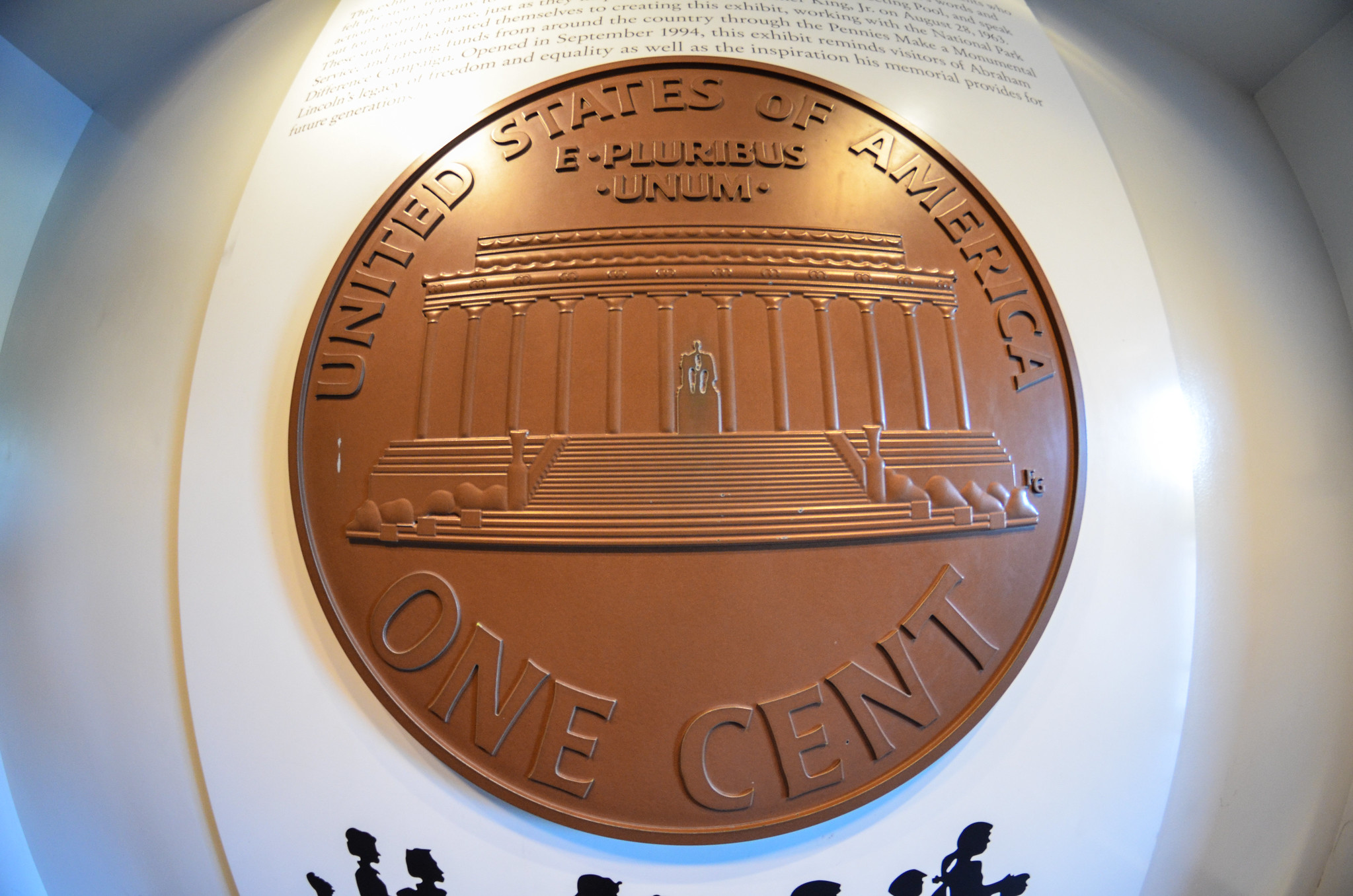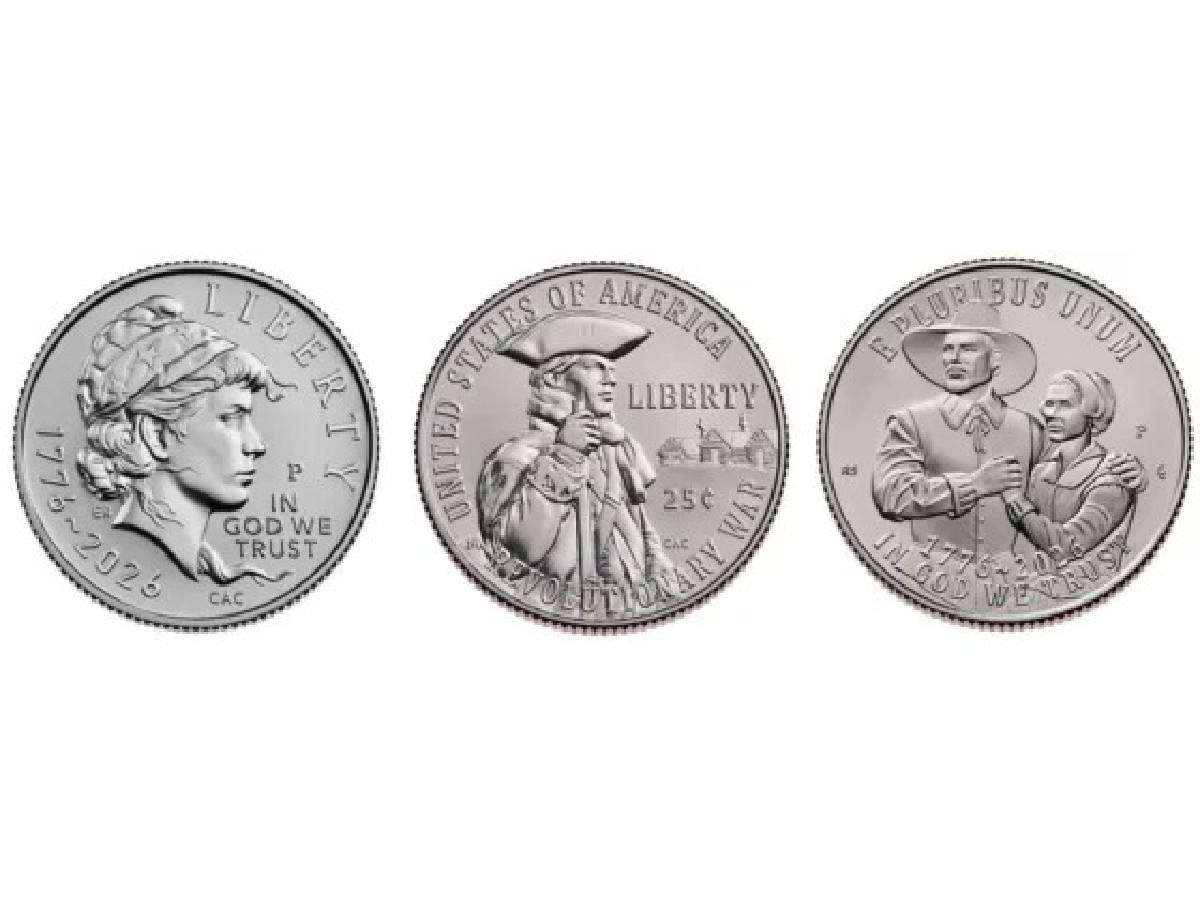There are many rare and valuable Lincoln Memorial pennies you should be looking for in pocket change, penny jars, bank rolls, old proof sets, and elsewhere.

Lincoln Memorial cents were struck from 1959 through 2008 and can still be easily found in circulation.
They’re regarded as a modern coin series by most numismatists. Yet, this popular series offers many exciting, highly valuable finds.
Do you know which Lincoln Memorial pennies are rare?
This list of 23 valuable and rare Lincoln Memorial pennies includes key dates, semi-key dates, errors, varieties, and other cool coins.
It’s time to get your coin loupe or magnifying glass out and start looking through all of your old pennies!
Don’t have a magnifying glass or coin loupe yet? Here are the ones I recommend.
An Eye For Detail Is Important!
There is quite a wide variety of rare Lincoln Memorial pennies out there worth a chunk of change. Be sure you carefully check that the dates and mintmarks match for these rare coins.
For example, the 1982-D bronze small date penny is a rare and valuable transitional rarity. But it’s not just ANY 1982 penny you need to be looking for. The 1982 bronze small date without the mintmark is common… so you don’t need to bother holding it aside or asking if “it’s the rare one.”
Also, doubled die error varieties such as the 1969-S doubled die is a very rare and valuable coin. Why? Because it’s scarce, high in demand, and easily visible to the naked eye. On the other hand, machine doubling on a 1985 penny is common and isn’t an error. It’s important to know the difference.
NOTE: You may find doubled dies on other Lincoln Memorial pennies not listed here, but they’re either very minor or very common and thus generally not worth very much — at least not as much as the 1969-S doubled die!
23 Rare Lincoln Memorial Pennies To Look For
On this list of 23 rare and valuable Lincoln Memorial cents, you’ll find pennies ranging from scarce but affordable semi-key dates… to stunning and rare error pennies that are worth as much as 6 figures!
Some are once-in-a-lifetime finds. Others are more run of the mill toughies that you can buy at most any coin shop or coin show — but may cost a bundle. Most fall somewhere in between.
One thing’s for sure… You’ll be in for a challenge as you look for these old and rare Lincoln pennies.
Good luck!
1960 Small Date Penny
Value: $2+
This isn’t a super rarity, but it’s the toughest of the various regular-issue 1960-dated Lincoln pennies.
What to look for:
You can identify the 1960 small date by the tops of the numerals “1” “9,” and “0” — they all align along an invisible plane.
Here’s a good visual for small date vs. large date pennies.
1960-D Over D Small Date Over Large Date Penny
Value: $150+
The 1960 small date penny from Philadelphia may be the scarcest of the regular-issue pennies from that year. But the rare and unusual 1960-D Over D Small Date Over Large Date Lincoln cent is the rarest of the error-varieties from the first year of the ’60s.
What to look for:
This one is actually easy to spot with the naked eye. You’ll see a jagged leg near the top of the “6” and a smaller “0” inside a larger “0” in the date. You’ll also spot a faintly visible ghost-like “D” mintmark floating halfway above the primary “D” mintmark. It’s a strange piece and one well worth looking for!
1969-S Doubled Die Penny
Value: $50,000 to $70,000+
There are few Lincoln Memorial pennies more rare or valuable than the 1969-S doubled die. Sometimes mistakenly called the 1969-S double die by some collectors, the 1969-S Lincoln doubled die cent is truly a fantastic variety. As of now, only a couple dozen examples of the 1969-S doubled die Lincoln penny are known, and they all sell for well into the 5 figures or higher!
What to look for:
Heavy doubling is seen in the inscriptions and date (but NOT the “S” mintmark) of this cool variety. And unlike minor doubled dies that often require 5X coin loupe and the squint of an eye to make out, this piece can be easily detected with the naked eye.
1970-S Small Date Penny
Value: $25+
This small date variety is much scarcer than the 1970-S large date and is commonly collected by Lincoln cent enthusiasts. And, while it’s a high-demand piece, it’s not prohibitively expensive for most collectors.
What to look for:
Look for the tops of the numerals in the date to align along the same imaginary plane. If they do, you’ve got a small date. If the top of the “7” is lower than the tops of the other numerals, your 1970 penny is the more common and less valuable large date.
1971 Doubled Die Obverse Penny
Value: $40+
Several hundred examples are thought to exist. But this one is not as widely collected as other doubled dies — such as the 1969-S doubled die (mentioned above) or 1995 doubled die pennies (mentioned below).
What to look for:
Light to moderate doubling in the obverse inscriptions of “IN GOD WE TRUST” and “LIBERTY” — it’s even evident with the naked eye.
1971-S Doubled Die Obverse Proof Penny
Value: $550+
While there are a few known varieties of the 1971-S doubled die proof penny, those with the strongest doubling are scarcest and worth the most money.
What to look for:
Doubling on this proof penny is mainly visible in “LIBERTY” and “IN GOD WE TRUST.”
1972 Doubled Die Penny
Value: $250+
As with many of the major doubled dies, there are a few known varieties. However, those with the strongest doubling are the rarest and most desirable — and the most valuable.
What to look for:
Strong doubling evident on the lettering and date on the obverse can be seen with the naked eye.
1979-S Type II Proof Penny
Value: $5+
There are two types of S-mint proofs from 1979, referred to as Type I and Type II. 1979-S Type II proof pennies are scarcer than 1979-S Type I proofs — so they command small but significant premiums over the Type I pennies.
What to look for:
Type I 1979-S proof pennies have a blobby “S” mintmark. The Type II version has a clearer “S”.
1981-S Type 2 Proof Penny
Value: $15+
There are two types of 1981-S proof pennies: Type I and Type II. The 1981-S Type II proof is much scarcer than the Type I and is quite desirable by coin collectors.
What to look for:
The 1981-S Type II proof penny has a so-called Clear S. The ends of the “S” have distinct, bulbous serifs. No part of the “S” connects with any other part of itself on the Type II variety. The much more common Type I shows the ends of the “S” nearly closing in the two interior loops at the top and bottom of the mintmark.
1982-D Bronze Small Date Penny
Value: $15,000
This transitional error wasn’t supposed to have been struck. Yet, somehow at least two of these 1982-D bronze small cents were struck when bronze planchets got into the presses intended to strike Denver-minted zinc small date cents. This error is a relatively recent discovery, with the first example found in 2016. Another surfaced sometime later, and the two pieces have sold for between $10,000 and $20,000 each. More examples of this extremely rare Lincoln Memorial penny may spring up in the future!
What to look for:
There are at least 3 diagnostics that any 1982-D bronze small date must meet, including:
- The penny must weigh about 3.11 grams — if it’s closer to 2.5 grams it’s zinc based and very common.
- The coin must have its “D” mintmark below the date — no exceptions!
- The date must be of the “small” variety. For the 1982 small date, that means the tops of all 4 numerals must align along the same imaginary plane and the “1,” “8,” and “2” all measure about the same height as each other.
Do you have a coin scale? Here are the coin scales that I recommend.
1983 Doubled Die Reverse Penny
Value: $350+
This is one of the most significant reverse doubled dies of the modern era
What to look for:
The 1983 doubled die penny shows heavy doubling in the reverse lettering — such as in the words “ONE CENT” and “E PLURIBUS UNUM.”
1983-D Bronze Penny
Value: $15,000+
Another transitional error involving the penny’s composition that’s worth looking for is the 1983-D copper penny.
What to look for:
It was accidentally struck on bronze planchets weighing about 3.11 grams versus the standard copper-coated zinc planchets that come in around 2.5 grams.
1984 Doubled Die Obverse Penny
Value: $200+
Also known as the 1984 doubled ear penny, this variety shows extreme doubling of Lincoln’s ear lobe.
What to look for:
This is easily visible to the naked eye, but you must know what you’re looking for. The doubled ear lobe is seen directly below Lincoln’s primary ear lobe.
1989-D Bronze Penny
Value: $3,000+
How did a bronze planchet end up in the penny presses at the Denver Mint some seven years after the last regular-issue bronze pennies were struck there? That’s perhaps a mystery for the ages. Nevertheless, this late transitional error is a rare and highly collectible piece that’s worth big bucks!
What to look for:
There’s one simple criteria for this coin — it must weigh about 3.11 grams. That’s the weight of a typical bronze Lincoln cent. If your 1989-D penny weighs approximately 2.5 grams, it’s the common zinc variety.
1990 No-S Proof Penny
Value: $3,500+
This odd rarity is the latest (and possibly the last!) no-mintmark error to have been made.
What to look for:
There is absolutely no trace of the “S” mintmark on some 1990 proof pennies (all of which should show the “S” mintmark).
NOTE: You will not find the 1990 no mintmark penny in circulation. It is found only in proof sets. Any 1990 pennies you find in pocket change without a mintmark are regular-issue and extremely common Philadelphia-minted pieces.
1992 Close AM Penny
Value: $20,000+
This transitional error coin was accidentally struck with a reverse design intended for the 1993 Lincoln Memorial penny.
What to look for:
These valuable and rare Lincoln Memorial pennies are detected by looking at the letters “A” and “M” in “AMERICA” on the reverse. The bottoms of those two letters should appear to be virtually touching each other. If you see any significant gap between the bottoms of the “A” and “M” it is not a Close AM variety.
Here’s a good visual for Wide AM and Close AM pennies.
1992-D Close AM Penny
Value: $15,000+
These are very rare and sought-after transitional errors and generally sell for 5 figures whenever they appear in the marketplace.
What to look for:
The 1992-D Close AM cent shows the “A” and “M” of “AMERICA” virtually touching each other at their bases.
1995 Doubled Die Penny
Value: $50+
This is the last major doubled die variety of the Lincoln Memorial penny series. When news of this error-variety first hit the media in the spring of 1995 it was thought to be a rare coin. However, many thousands of examples have since been found. It’s still scarce, but it’s no longer a super-expensive coin — at least in the lower uncirculated grades.
What to look for:
The 1995 doubled die penny shows heavy doubling most evident in the lettering of “IN GOD WE TRUST” and “LIBERTY.”
1998 Wide AM Penny
Value: $20+
This is a scarce but affordable variety that was struck using the reverse die of a proof 1998-S Lincoln penny.
What to look for:
It exhibits a significant gap between the bases of the “A” and “M” in “AMERICA” on the reverse of the coin.
1998-S Close AM Penny
Value: $450+
This scarce and sought-after variety is a similar and presumably accidental switch-a-roo of reverse dies as seen with some of the other 1990s Lincoln pennies listed above.
What to look for:
It was struck with a circulation die bearing the “Close AM” design — so look for the “A” and “M” of “AMERICA” to be practically touching each other at their bases.
1999 Wide AM Penny
Value: $450+
While similar in origin to the 1998 Wide AM Lincoln penny, this 1999 business-strike variety is much rarer.
What to look for:
This rare penny is identified by the wider spacing between the bases of the “A” and “M” than usually seen on 1999 Lincoln pennies.
1999-S Close AM Penny
Value: $75+
There are lots of AM varieties for these 1990s pennies, huh? Well, here’s another — and it still wasn’t the last.
What to look for:
This is a scarce variety noted by the virtually touching bases of the “A” and “M” in “AMERICA” on the coin’s reverse.
2000 Wide AM Penny
Value: $15+
We’ve arrived at the last of the valuable and rare Lincoln Memorial pennies on this list. And, wouldn’t you guess, it’s another AM variety. It’s not necessarily a highly rare or expensive variety, but it’s notable and quite collectible nonetheless.
What to look for:
You will notice significant spacing between the bases of the “A” and “M” in “AMERICA” on the reverse of this business-strike penny.




